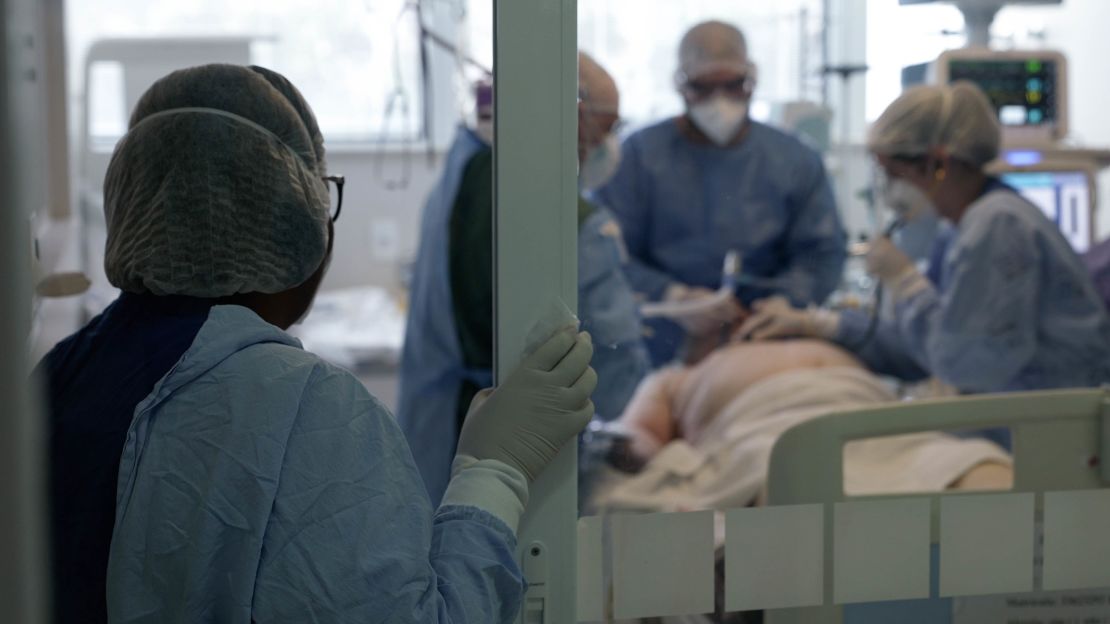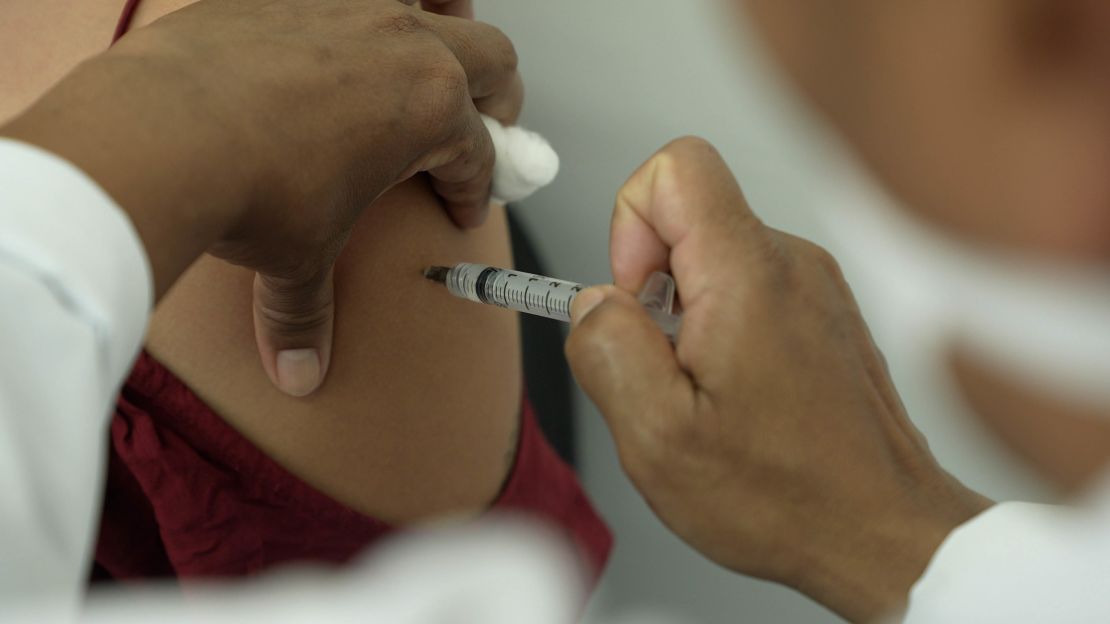Some of the sickest people in S?o Paulo, Brazil occupy the rooms inside the Covid-19 ward at the Emilio Ribas Institute of Infectious Disease.
Machines beep and whir, nurses and doctors a blur as they rush into the room of an elderly man who is gasping for air that won’t come. The decision to intubate is made quickly. It is his only chance at a survival far from guaranteed.
Among the half-dozen or so in the room, nurse Monica Aparecida Calazans says she has already seen too much death. “I’ve already lost eight of my colleagues to Covid,” she said. “It is such a cruel disease.”
Calazans risks her life every day to fight a pandemic that Brazil is nowhere close to getting under control. Yet, in a way, she’s lucky.
In mid-January, Calazans was the very first Brazilian to receive a vaccine, no small feat in a country where the vaccine rollout has been nothing short of disastrous.
As of Sunday, only 0.5% percent of the country had received a first dose of either the AstraZeneca or Sinovac vaccines. Not a single person in Brazil has been fully vaccinated apart from some who took part in vaccine clinical trials.
Further, vaccine supplies are extremely limited and there remains a startling lack of detail in government plans to secure more.
“I would’ve said Brazil would be the first”
Back in June 2020, few thought Brazil would be struggling so badly with its rollout.
The country’s massive national healthcare system, with health workers present in nearly all of Brazil’s thousands of municipalities through a series of hospitals and clinics, has a long history of successfully vaccinating its people.
But multiple experts say the ineptitude of the federal government, led by Covid-skeptic President Jair Bolsonaro, has sabotaged its coronavirus response. They point to a distinct lack of urgency on the part of the federal government to secure supplies and a lack of diversification in vaccine supply.
“At the beginning of the pandemic I would’ve said to you that Brazil would be the first country in Latin America to vaccinate its population because we know how to do it,” said Natalia Pasternak, a Brazilian microbiologist and healthcare advocate. “We have all the infrastructure we need. Now we just need a better president.”
Brazilian federal health officials initially announced a rollout plan similar to that of many other major countries. It would manufacture AstraZeneca’s vaccine in-country, producing some 30 million doses by the end of January 2021.
Some 200 million more would be produced by the end of the year, administered first to healthcare workers and the elderly and then on down the line in order of vulnerability.
Brazil’s government clearly placed its initial hopes on the AstraZeneca vaccine. But its vaccine trials took longer than some others, a perfectly normal and foreseeable possibility given the unprecedented nature of Covid-19 vaccine development.
Brazil’s vaccine regulatory agency finally granted AstraZeneca’s vaccine emergency use authorization on January 17th, but a lack of the active ingredient needed to make the vaccine means that Brazilian labs have yet to start production of the hundreds of millions of doses it needs.

Supplies are due to begin arriving this week, but the delay has all but obliterated the government’s timeline. There is no set date for when finished doses will begin to ship.
As large countries with similar purchasing power negotiated agreements last year to buy other vaccines from the likes of Moderna and Sinovac, Brazil stood pat.
Brazil’s health minister even turned down an August offer from Pfizer to purchase up to 70 million doses of its vaccine. The ministry defended the decision, saying in part it was concerned about a payment guarantee and an agreement that contractual issues be handled in a US court.
“This is why you don’t put all your eggs in one basket,” said Pasternak. “There is no reasonable explanation to not plan ahead on how you’re going to vaccinate your population.”
Still, Bolsonaro said recently that no government would “do better than my government is doing.”
Bolsonaro’s China flip-flop
Brazil’s best hope for a vaccine supply in the near-term is likely the CoronaVac, developed by Chinese firm Sinovac. Regulators approved its emergency use on January 17th and the Bolsonaro administration has approved the purchase of 100 million doses.
It’s an ironic outcome after Bolsonaro spent months attacking the vaccine, at times suggesting the Chinese-developed product could kill or disable those who take it, assertions made with zero evidence.
He leaned into discrediting the vaccine as S?o Paulo Governer Jo?o Doria, a key political rival and likely competitor in the 2022 presidential race, embraced it.
Doria went around the Bolsonaro administration and negotiated directly with China for the Sinovac vaccine, ultimately securing millions of doses. Doria says the president’s inaction on securing supplies forced his hand. “In Brazil, we have to combat two viruses, the coronavirus and the Bolsonaro virus,” Doria said in an interview.
Doria was forced to turn over his state’s supply of the Chinese-made vaccine to the federal government. “We must [vaccinate] faster than we are going now,” he said. “We need more vaccines but this responsibility belongs to the federal government.”

Both men might now be stuck with a vaccine that seems to be less effective than others. Recent data shows the CoronaVac vaccine to have an efficacy of 50.4 percent, clearing the WHO guideline of 50 percent by the slimmest of margins.
Bolsonaro has said that in addition to the purchase agreements already in place, his administration would buy vaccines as they become available. It is a vague statement, considering vaccines are among the most sought after commodities in the world.
Angry, frustrated, and helpless
The confusion and frustration over Brazil’s vaccine rollout come at a time when Brazil’s outbreak has never been worse.
In addition to daily case and death total increases that are among the highest of the pandemic so far, a new Covid -19 variant has emerged that epidemiologists say is likely more easily transmissible and could be more lethal.
Vaccines are needed more than ever but right now, that supply simply doesn’t exist. Júlio César Barbosa, a nurse who works at a public hospital in S?o Paulo, has volunteered to vaccinate people, but says he feels helpless amid the shortage. “I’m worried and I’m angry with our government because from the very beginning they have trivialized this virus.”
CNN’s Natalie Gallón contributed to this report.




